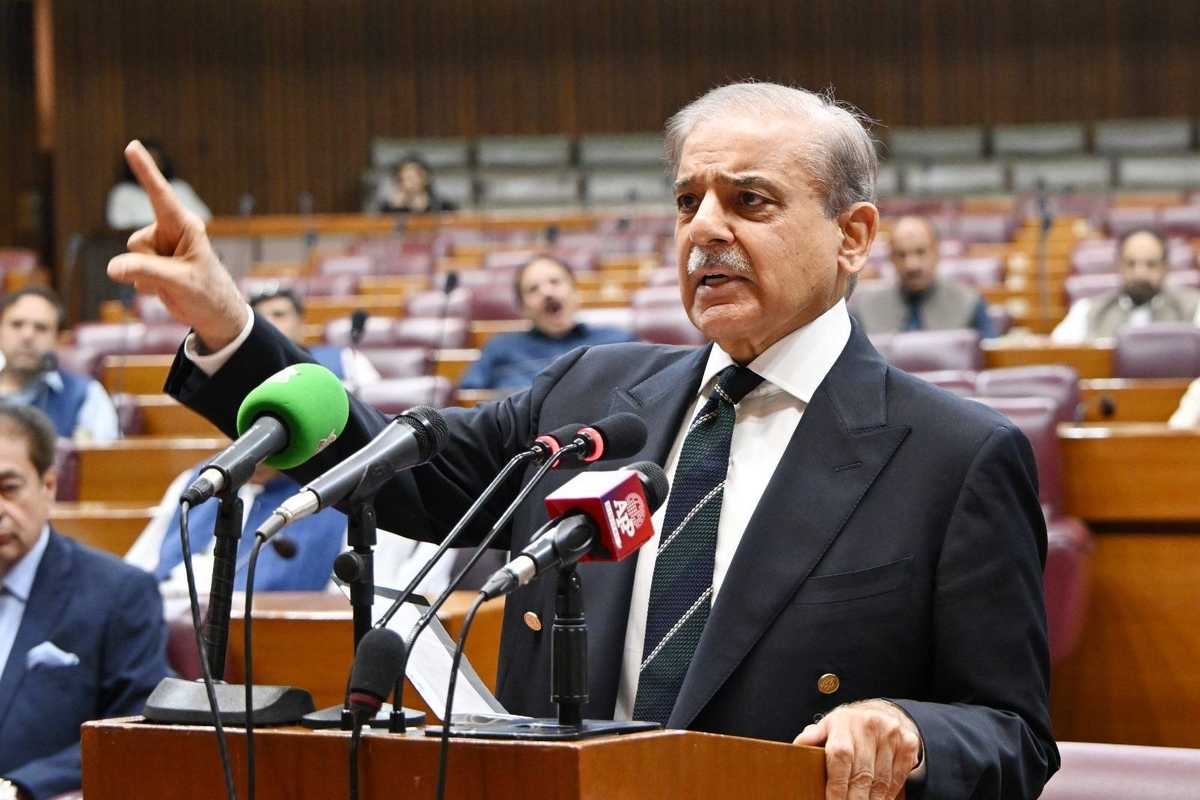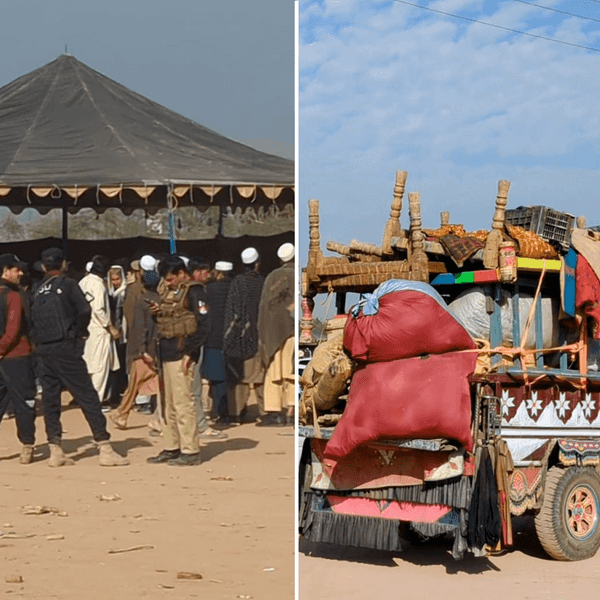Pakistan PM hails military’s ‘befitting reply’ to Indian aggression
PTI’s Gohar calls PM’s unity offer ‘a step forward’, warns nation can’t move ahead as ‘one hand cannot clap alone’

Javed Hussain
Correspondent
I have almost 20 years of experience in print, radio, and TV media. I started my career with "Daily Jang" after which I got the opportunity to work in FM 103, Radio Pakistan, News One, Ab Tak News, Dawn News TV, Dunya News, 92 News and regional channels Rohi TV, Apna Channel and Sach TV where I worked and gained experience in different areas of all three mediums. My journey from reporting to news anchor in these organisations was excellent. Now, I am working as a correspondent with Nukta in Islamabad, where I get the opportunity of in-depth journalism and storytelling while I am now covering parliamentary affairs, politics, and technology.

Pakistan's Prime Minister Shehbaz Sharif addresses the National Assembly on Wednesday, May 7,2025.
Facebook/NA of Pakistan
Pakistan’s Prime Minister Shahbaz Sharif on Wednesday claimed that the country’s military had successfully repelled a major Indian attack, describing the moment as a “historic occasion” during his address to the National Assembly after the cross-border hostilities.
“Last night, the enemy tried to attack Pakistan secretly, like it has done in the past,” Sharif said. “With the prayers of 240 million people, the Pakistani army gave a befitting reply to India and turned the dark night into a moonlit night.”
- YouTubewww.youtube.com
Sharif said the Pakistan Air Force was fully prepared and responded immediately to the Indian incursion. “Pakistan's eagles were fully prepared. As soon as the Indian planes attacked, the Pakistan Air Force shot down three of their Rafales fighter jets and shot down two drones,” he said.
He added that recent claims about India’s superiority in conventional warfare had been proven wrong. “Those who used to say that India has left Pakistan behind in conventional warfare have come to know today that Pakistan is prepared for any eventuality,” Sharif declared.
The prime minister confirmed that Pakistani citizens were killed in the attack. “Many of our citizens have been martyred in this attack,” he said. The National Assembly observed prayers for the dead, led by Federal Minister Ahsan Iqbal.
Sharif said he and the country’s president will be attending a martyr’s funeral in Islamabad later today. “The President and I will attend the funeral of a martyr in Islamabad, and the Army Chief will also attend. We express our full solidarity with our martyrs. These soldiers are the heroes of Pakistan, and I salute them.”
He also spoke about diplomatic outreach following the incident. “The Deputy Prime Minister and I spoke to various world leaders,” he said, adding that he learned of the Pahalgam incident while in Ankara. He reiterated Pakistan’s denial of involvement in the incident, which reportedly triggered the Indian strike.
“I said in Kakul that Pakistan has nothing to do with this incident. I promised that a transparent investigation into this incident should be conducted, and Pakistan will cooperate fully,” Sharif said.
However, he accused India of dismissing the offer of cooperation. “India did not take our offer seriously. They summoned our ambassador and demarche him,” he said. He praised the country’s armed forces for their readiness. “I congratulate the people that our forces were ready to pick up their weapons and give our enemy a befitting response.”
Sharif added that the PAF had been on alert well in advance. “Four days ago, the Pakistan Air Force was fully prepared to confront India's Rafale jets,” he said.
According to the prime minister, India launched attacks on six cities in Pakistan with “full preparation.” He said Pakistan had been monitoring India's “intentions” closely.
Prime Minister Sharif extended an offer of cooperation to the opposition and invited them to engage in dialogue to promote political stability in the country.
“I say to my PTI brothers and sisters, let us unite. I am ready to sit with you in my chamber, together as one. This is the best opportunity for unity, let us seize it,” he said.
‘Like mosquitoes’
Pakistan Peoples Party (PPP) Chairman Bilawal Bhutto Zardari, while addressing the National Assembly, praised the military’s rapid response. “We salute our forces who shot down Indian planes like mosquitoes,” he said.
Bhutto condemned the strikes as a cowardly assault on innocent civilians. “We stand with the families of these martyrs,” he said. “Thieves and cowards attack in the darkness of night. They should fight our army during the day, but instead they attack children and women at night.”
He accused India of barbarism and warned of consequences. “India has become barbaric. The people of Pakistan are not in favor of war, but you have attacked our land, now be prepared, Pakistan's response is coming.”
‘Khan key to unity’
Pakistan Tehreek-e-Insaf (PTI) leader Zartaj Gul, speaking on the occasion, emphasized that Pakistan itself has long been a victim of terrorism.
Gul called for national unity and urged dialogue with PTI founder and former Prime Minister Imran Khan. “Everyone should talk to Imran Khan, go to Imran Khan, and demonstrate national unity. We have given up our stubbornness and ego, you should also give up your stubbornness and ego,” she said. “Imran Khan should be called, and national unity should be demonstrated.”
She added that all political parties must be involved in charting a collective course of action. “All political parties should be called to decide whether to prolong this matter or to reduce this situation.”
PM’s offer ‘a step in the right direction’, says Gohar
PTI Chairman Barrister Gohar Ali Khan said Pakistan stood united against Indian aggression and would respond with full force if provoked again.
Speaking on the floor of the National Assembly, Gohar declared that India could not divide Pakistan through its “Hindutva narrative”, stressing that the entire nation considered Pakistan its “red line”.
"We downed five of India’s aircraft… we responded immediately and effectively. We congratulate the nation on this swift and befitting response," he said.
The PTI leader said any further aggression by India would be met with an equally strong reply, recalling Imran Khan's warning that Pakistan would not hesitate to respond.
“We grieve for our martyrs — we have carried their coffins,” he added. “India hasn’t even condemned the attack on our Jaffar Express.”
Gohar welcomed the prime minister’s offer for talks, but cautioned that national unity was key to progress.
“One hand cannot clap alone. If we remain divided, we won’t move forward,” he said, adding that the prime minister had invited lawmakers to his chamber for a meeting, which was a step in the right direction.
He also referenced Indian political history, saying: “In 1975, Indira Gandhi approached Atal Bihari Vajpayee for support. Dialogue is always the way forward.”
Reaffirming his support for PTI’s jailed founder, Gohar said: “Pakistan belongs to all of us. We are ready to cooperate in every way. Imran Khan is the people’s leader.”
He called for a broader political consensus for the sake of the next generation, demanding the release of Imran and other political prisoners.
“A charge sheet has been filed against us,” he said, “but we must find a political solution.”
Calling on the National Assembly speaker to facilitate the process, he added: “Mr Speaker, play your role. Whatever you decide, we will carry it forward.”
NSC meeting
Earlier in the day, Prime Minister Sharif chaired a meeting of the National Security Committee (NSC) to assess the fallout from the overnight strikes.
A statement from the Prime Minister’s Office said the forum condemned India’s “cowardly and unlawful act of war” and offered prayers for the civilians killed.
According to the statement, the Indian military used missiles, drones, and aircraft to target multiple locations across Pakistan’s Punjab province and Pakistan-administered Kashmir, including Sialkot, Muridke, Bahawalpur, Kotli, and Muzaffarabad. Civilian infrastructure, including mosques and the Neelum-Jhelum Hydropower Project, was hit.
Pakistan claimed the Indian attacks endangered international air traffic and violated international conventions. The NSC rejected India’s justification for the strikes, describing the claims of terrorist camps as “imaginary” and pointing out that international media had visited the alleged sites just hours before the attack.
The committee called India’s military action a “heinous and shameful crime” and “a naked violation” of Pakistan’s sovereignty and international law.
“India, against all sanity and rationality, has once again ignited an inferno in the region,” the NSC said in its statement, adding that the full responsibility for the consequences shall lie squarely with India.
Pakistan reiterated that it had previously offered a transparent investigation into the April 22 attack in Kashmir, which India cited as justification for the strikes. That offer, Islamabad said, was ignored.
The NSC reaffirmed that Pakistan’s armed forces had acted in self-defense and were authorized to carry out corresponding actions.
"In consonance with Article 51 of the UN Charter, Pakistan reserves the right to respond, in self-defense, at a time, place, and manner of its choosing to avenge the loss of innocent Pakistani lives and blatant violation of its sovereignty. The Armed Forces of Pakistan have duly been authorized to undertake corresponding actions in this regard," the statement read.
The statement concluded with a call for the international community to hold India accountable and reiterated Pakistan’s commitment to peace with “dignity and honor.”
Indian incursion
The Indian military action, referred to by New Delhi as “Operation Sindoor,” was launched early Wednesday. Indian officials claimed the strikes targeted nine “terrorist camps” in Pakistan and Pakistan-administered Kashmir.
“Intelligence showed that further attacks were imminent,” Indian Foreign Secretary Vikram Misri said. “We had to take pre-emptive and precautionary action.”
Pakistan denied that any of the targeted sites were used for militant activities and said 24 weapons struck civilian areas.
The Indian strike follows the Pahalgam attack in Indian-administered Kashmir, which killed 26 tourists. India has blamed Pakistan-based militants for the incident, an allegation Pakistan has strongly denied.







Comments
See what people are discussing